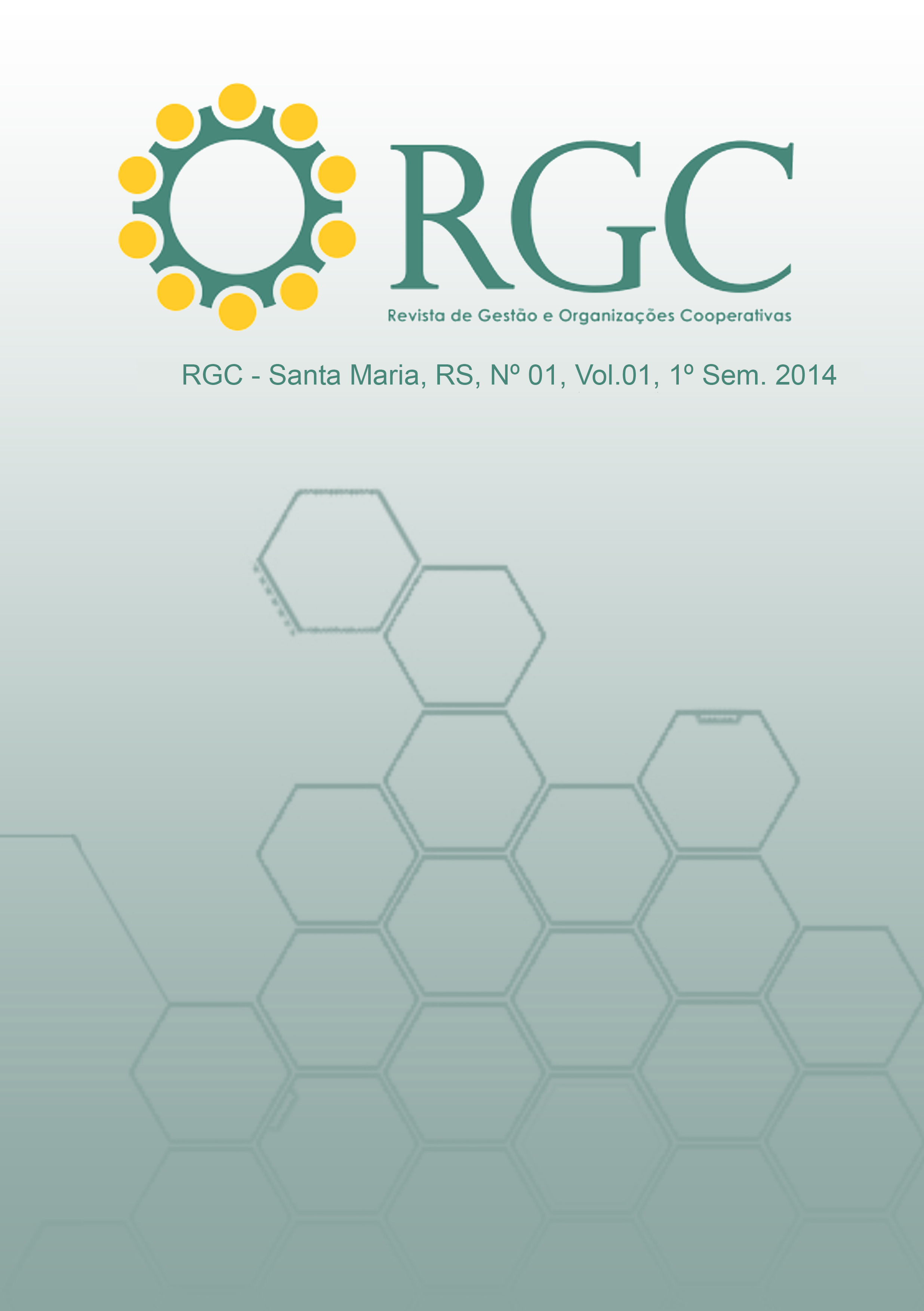Study of the Interaction of a Cooperative Housing With Societyt
DOI:
https://doi.org/10.5902/2359043215441Keywords:
Cooperative, Housing cooperative, Cooperative principles, Sustainable development, SocietyAbstract
The interaction between cooperative organizations and of solidarity economy and the society is the principal focus of this assignment, emphasizing the influence that this kind of cooperation gets, becoming a mechanism of transformation and social inclusion, in addiction, what these interactions are made of. For this, we chose a housing cooperative. This research is classified as qualitative case study, getting done through semi-structured interviews with the President, the Pedagogic Directory and a cooperating person. The results reveal that the cooperative principles are rooted in the activities of the cooperative, especially the principles of self-management, free membership and education. Although this organization had been in difficulties in its beginning, results demonstrated that society keeps opening space to the cooperativism ideals. Join the cooperative shows that it is possible to have personal and social development, which serves as the impetus and motivation to expand the activities of the cooperative, it is necessary to be a change in the mindset of society so that the cooperative thinking and the way of organize the cooperatives can gain space in people’s lives.Downloads
References
BARBOSA, Benedito Roberto; PESSINA, Leonardo; RODRIGUES, Evaniza. Produção social da moradia: desafios da política de habitação. Revista Proposta. Rio de Janeiro: Fase, nº 116, p. 21-25, 2008.
BLOG SICOOB. Mercado Cooperativista: A influência do cooperativismo para o desenvolvimento da sociedade. Disponível em: <http://www.blogsicoob.com.br/noticias/mercado-cooperativista/279-a-influencia-do-cooperativismo-para-o-desenvolvimento-da-sociedade> Acesso em: 23abril 2014.
BRASIL. Código civil. Congresso Nacional.
BRASIL COOPERATIVO. Cooperativismo: forma ideal de organização. Disponível em: <http://www.brasilcooperativo.coop.br/site/cooperativismo/index.asp> Acesso em: 23 abril 2014
BRÜSEKE, Franz Josef. O problema do desenvolvimento sustentável. In: CAVALCANTI, C. (org). Desenvolvimento e natureza: estudos para uma sociedade sustentável. 5ed. São Paulo: Cortez, 2009.
CARVALHO, Adriano Dias de. O Cooperativismo sob a ótica da gestão estratégica global. Disponível em: <http://books.google.com.br/books?id=9NezSINppmsC&printsec=frontcover&dq=cooperativismo&hl=pt-BR&sa=X&ei=2MlfU-3UJcXs2QXHxICQCg&ved=0CDkQ6AEwAA#v=onepage&q=ideiais%20&f=false> Acesso em: 25 abril 2014.
CASTELO, Dora Bussab. Cooperativas e associações habitacionais. Revista de Direito Imobiliário. Editora Revista dos Tribunais, n. 46, p.134-182, jun. 1999.
SCHMIDT, Derli; PERIUS, Vergílio. Cooperativismo e cooperativa. In: CATTANI, Antonio David (org.). A outra economia. Porto Alegre: Veraz, 2003.
CMMA. Nosso futuro comum. Rio de Janeiro: Fundação Getúlio Vargas, 1988.
DICKMANN, Ivanio; DICKMANN, Ivo. Manual do cooperativado. São Paulo: Coohabras, 2011.
DICKMANN, Ivanio; DICKMANN, Ivo; MAGRI, Cledir. Construindo cidadania: cooperativas de habitação, política pública e educação popular. Passo Fundo: Battistel, 2011.
DICKMANN, Ivanio. Cooperativas habitacionais no Brasil In: Conferência Regional das Américas, São Paulo 6-8 out. 2013.
Energia, Ambiente e Desenvolvimento. Caderno digital de informação sobre energia, ambiente e desenvolvimento Disponível em: <http://ambientes.ambientebrasil.com.br/gestao/artigos/desenvolvimento_sustentavel.html> Acesso em: 22/04/2014.
FRANTZ, W. Associativismo, cooperativismo e economia solidária. Ijuí: Editora Unijuí, 2012.
GONÇALVES, D. Revista espaço acadêmico: Desenvolvimento sustentável: o desafio da presente geração. – Nº 51, 2005. Disponível em: <http://www.espacoacademico.com.br/051/51goncalves.htm> Acessado em: 07/07/2014
JESUS, Paulo de; TIRIBA, Lia. Cooperação. In: CATTANI, Antonio David (Org). A outra economia. Porto Alegre: Veraz Editores, 2003.
LOURENÇO, Nielson Polucena; LUNA, Flávio Melo de; SOUSA; Joceia Gouveia de. Cooperativismo, cooperação e território: um estudo de caso na Coopapi em Apodi – RN, Brasil. Disponível em: <http://www.egal2013.pe/wp-content/uploads/2013/07/Tra_Nielson-Polucena-Louren%C3%A7o-Fl%C3%A1vio-Melo-de-Luna-Joceia-Gouveia-de-Sousa.pdf> Acesso em: 19/04/2014.
MANZINI, José Eduardo. Uso da entrevista em dissertações e teses produzidas em um programa de pós-graduação em educação. Revista Percurso. Maringá, n. 2, p. 149-171, 2012.
MARCONI, Marina de Andrade; LAKATOS, Eva Maria. Fundamentos da metodologia científica. 7ed. São Paulo: Editora Atlas, 2010.
MENDES, Armando Dias. Envolvimento e desenvolvimento: introdução à simpatia de todas as coisas. In: CAVALCANTI, C. (org). Desenvolvimento
e natureza: estudos para uma sociedade sustentável. 5ed. São Paulo: Cortez, 2009.
RIOS, Gilvando Sá Leitão. Cooperação e tipos de cooperativismo no Brasil. Disponível em:<http://tupi.fisica.ufmg.br/~michel/docs/Artigos_e_textos/Gestao_de_cooperativas/tipos%20de%20cooperativismo.pdf
> Acesso em: 19/04/2014.
SEBRAE. Cultura da cooperação: série empreendimentos coletivos. Disponível em: <http://www.cbn.org.br/redemi/download/cultura_de_cooperacao_sebrae.pdf> Acesso em: 19/04/2014.
SICOOB Blucredi. História do cooperativismo. Programa Cooperação, 2013 (microfilme).
Downloads
Published
How to Cite
Issue
Section
License
Authors who publish in this journal agree to the following terms:
- Authors retain copyright and grant the journal the right of first publication, with work simultaneously licensed under the Creative Commons Attribution License that allows the sharing of work with acknowledgment of authorship and initial publication in this journal.
- Authors are authorized to enter additional contracts separately for non-exclusive distribution of the version of the work published in this journal (eg, publishing in institutional repository or as a book chapter), with acknowledgment of authorship and initial publication in this journal.
- Authors are allowed and encouraged to post and distribute their work online (eg, in institutional repositories or on their personal page) at any point before or during the editorial process, as this can bring about productive change as well as increase impact and impact. citation of published work (See The Effect of Free Access).







